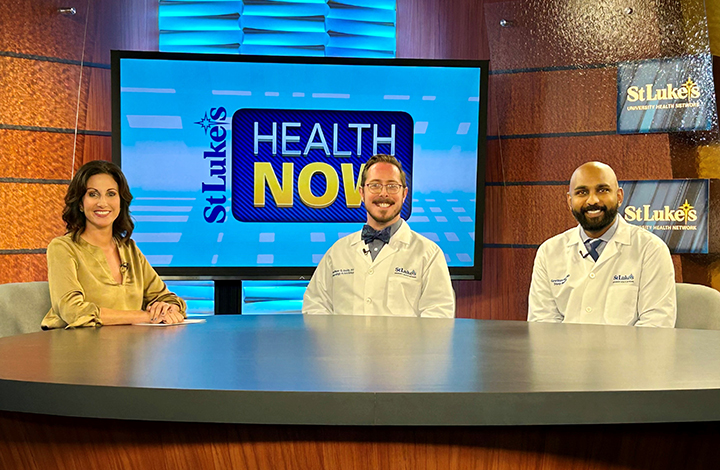News
Colorectal Cancer Screening Saves Lives
May 15, 2017
There’s been a lot of talk in the news lately about making good deals so here’s one for you: If you were offered the chance of extending your life in exchange for a day or two of discomfort, would you take the deal?
Colonoscopy, and other tests that screen for colorectal cancer – the second leading cancer killer – have been widely credited for saving lives. And yet, the Centers for Disease Control and Prevention (CDC) estimates that one in three adults aged 50 to 75 have not been tested. March is colorectal cancer awareness month.
“Colonoscopy is the gold standard of colorectal cancer screening because it is very effective at identifying growths called polyps that if left untreated could develop into cancer,” says Noel Martins, MD, Chief of Gastroenterology, St. Luke’s University Health Network. “Many people fear the test and put it off until symptoms appear. As a result, when some patients finally come to us they have cancer that could have been prevented.”
To prepare for a colonoscopy, one must be on a liquid diet a day or two before the scheduled test, drink large volumes of liquid laxative and make frequent trips to the bathroom.
“Although the bowel preparation can be unpleasant and it can be difficult to find time in our busy schedules for a colonoscopy,” Dr. Martins concedes, “studies indicate that colonoscopy is very effective in prevent cancer deaths. For example, a 2012 report published in the New England Journal of Medicine tracked patients for as long as 20 years and concluded that the death rate from colorectal cancer was cut by 53 percent in those who had the test and had precancerous growths removed.”
During the colonoscopy, the physician – usually a gastroenterologist or colorectal surgeon –places a thin, flexible tube into the rectum and colon. The tube is equipped with a camera that projects a picture of the patient’s colon onto a screen. A clean colon enables the physician to clearly see and remove any irregular growths called polyps that could develop into colon cancer.
“Generally, patients receive anesthesia and do not feel anything during the procedure,” says colorectal surgeon, Camille Eyvazzadeh, MD. “If we find any polyps, we remove them and have them tested. If cancer is found, we begin treatment immediately, improving the outcome.”
Colon cancer is the third most commonly diagnosed cancer in men and women combined in the United States. This year alone, 136,830 people will be diagnosed and 50,310 will die from this disease, the American Cancer Society estimates.
In addition to routine screening every 10 years beginning at age 50, Dr. Eyvazzadeh recommends the procedure at a younger age, or more frequently, should the patient have:
• A personal history of colorectal cancer or polyps
• A personal history of inflammatory bowel disease (ulcerative colitis or Crohn’s disease)
• A strong family history of colorectal cancer or polyps
• A known family history of a hereditary colorectal cancer syndrome
The screening guidelines were established by the U.S. Preventive Services Task Force (USPSTF) and the American College of Physicians (ACP), who set the upper age limit at 75. However, the guidelines recommend colon cancer surveillance for people older than age 75 who have an increased risk of colon cancer, such as family history, a previously diagnosed colon cancer or adenomatous polyps.
“With colonoscopy and advanced age, we consider the likelihood that the test, and any treatment needed, would extend the patient’s life,” Dr. Martins says. “Consequently, if the individual is very healthy and has few or no chronic illnesses, we might recommend colonoscopy even after age 75.”
Colonoscopy, and other tests that screen for colorectal cancer – the second leading cancer killer – have been widely credited for saving lives. And yet, the Centers for Disease Control and Prevention (CDC) estimates that one in three adults aged 50 to 75 have not been tested. March is colorectal cancer awareness month.
“Colonoscopy is the gold standard of colorectal cancer screening because it is very effective at identifying growths called polyps that if left untreated could develop into cancer,” says Noel Martins, MD, Chief of Gastroenterology, St. Luke’s University Health Network. “Many people fear the test and put it off until symptoms appear. As a result, when some patients finally come to us they have cancer that could have been prevented.”
To prepare for a colonoscopy, one must be on a liquid diet a day or two before the scheduled test, drink large volumes of liquid laxative and make frequent trips to the bathroom.
“Although the bowel preparation can be unpleasant and it can be difficult to find time in our busy schedules for a colonoscopy,” Dr. Martins concedes, “studies indicate that colonoscopy is very effective in prevent cancer deaths. For example, a 2012 report published in the New England Journal of Medicine tracked patients for as long as 20 years and concluded that the death rate from colorectal cancer was cut by 53 percent in those who had the test and had precancerous growths removed.”
During the colonoscopy, the physician – usually a gastroenterologist or colorectal surgeon –places a thin, flexible tube into the rectum and colon. The tube is equipped with a camera that projects a picture of the patient’s colon onto a screen. A clean colon enables the physician to clearly see and remove any irregular growths called polyps that could develop into colon cancer.
“Generally, patients receive anesthesia and do not feel anything during the procedure,” says colorectal surgeon, Camille Eyvazzadeh, MD. “If we find any polyps, we remove them and have them tested. If cancer is found, we begin treatment immediately, improving the outcome.”
Colon cancer is the third most commonly diagnosed cancer in men and women combined in the United States. This year alone, 136,830 people will be diagnosed and 50,310 will die from this disease, the American Cancer Society estimates.
In addition to routine screening every 10 years beginning at age 50, Dr. Eyvazzadeh recommends the procedure at a younger age, or more frequently, should the patient have:
• A personal history of colorectal cancer or polyps
• A personal history of inflammatory bowel disease (ulcerative colitis or Crohn’s disease)
• A strong family history of colorectal cancer or polyps
• A known family history of a hereditary colorectal cancer syndrome
The screening guidelines were established by the U.S. Preventive Services Task Force (USPSTF) and the American College of Physicians (ACP), who set the upper age limit at 75. However, the guidelines recommend colon cancer surveillance for people older than age 75 who have an increased risk of colon cancer, such as family history, a previously diagnosed colon cancer or adenomatous polyps.
“With colonoscopy and advanced age, we consider the likelihood that the test, and any treatment needed, would extend the patient’s life,” Dr. Martins says. “Consequently, if the individual is very healthy and has few or no chronic illnesses, we might recommend colonoscopy even after age 75.”
Medicare and most third party payers will usually pay for colon cancer screening, including colonoscopy. But, to be sure, contact your insurance provider to determine coverage, deductibles and co-pays.
To find a physician, call St. Luke’s InfoLink toll-free at 1-866-STLUKES (785-8537). For more information on-line, visit slhn.org/conditions-services/digestive.



